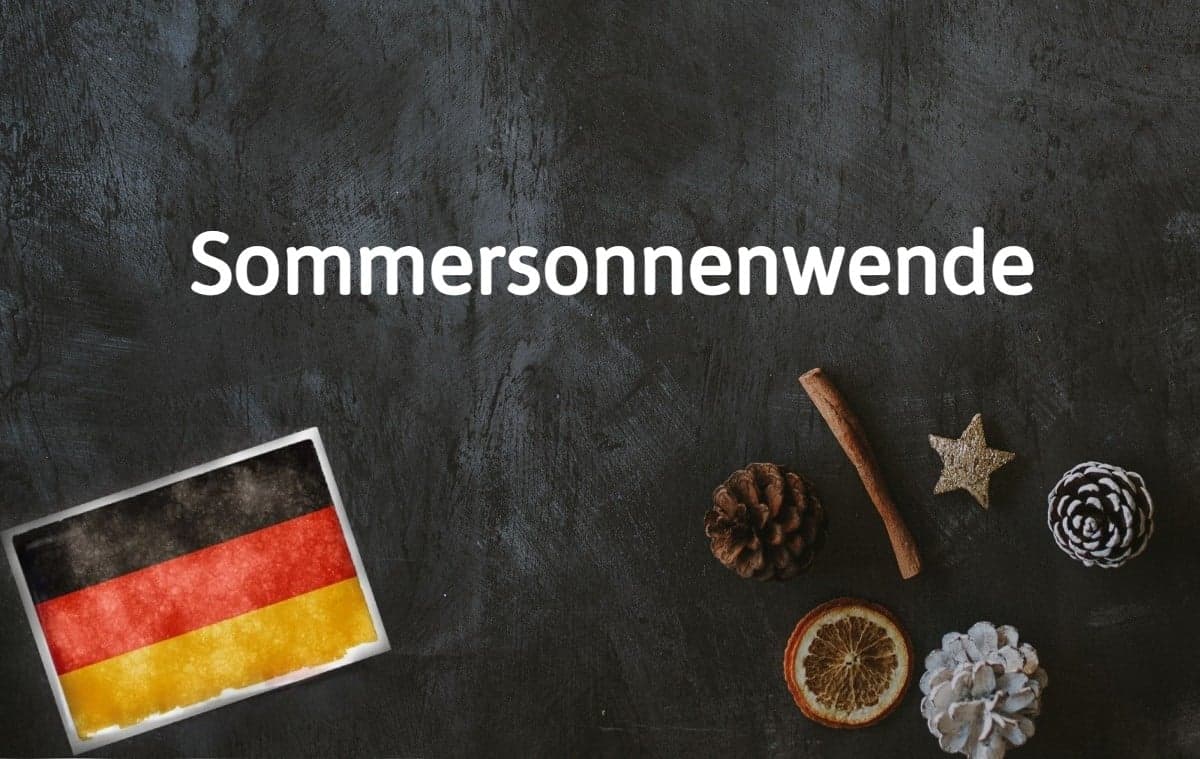German word of the day: Sommersonnenwende

This German word marks the changing of seasons, and the longest day of the year.
Die Sommersonnenwende, pronounced like this, is the German term for the summer solstice, which is the day that marks the meteorological beginning of summer in Germany and the northern hemisphere.
Alternative names for the day are Sommer Solstitium, which comes from the Latin term, and Mittsommer.
Like so many great German words, the term for the summer solstice is a compound noun which translates quite literally. It’s made up of three simple words: Sommer (summer), Sonnen (sun) and Wende (turn or turnaround).
So the name for the summer solstice in German is meant to remind you that this is the day that the sun ends its journey northward in the sky, and turns around.
As you can probably guess, the winter solstice is called die Wintersonnenwende.
You might recognise the term Wende from another compound noun that got a fair amount of attention in recent years – Energiewende, which means energy transition, has also been used to describe Germany’s big picture plans to phase out fossil fuel use.
The summer solstice usually falls on June 21st or 22nd. But it fell on June 20th this year, due to 2024 being a leap year.
How is ‘die Sommersonnenwende’ observed in Germany
Humans have taken note of, and celebrated, the summer solstice for thousands of years.
Archaeologists suggest that Stone Age cultures were already able to determine the day. Evidence of this was uncovered in 2004 at the site of a 7000-year-old solar observatory found in Goseck in Saxony-Anhalt.
Among Germanic tribes, the summer solstice was celebrated with pagan folk festivals that often included fire rituals.
After Christianization of the region, the Catholic Church tried to abolish the pagan solstice traditions - eventually designating the day for a memorial day for John the Baptist (June 24th), and adopting the fire as a symbol for Jesus Christ.
Most of the original solstice traditions have been lost, but some are being reinvigorated for tourism, especially on the Baltic Sea coast.
More broadly, the long daylight hours experienced in the weeks before and after the summer solstice, offer a chance to stay out or do outdoor activities late into the evening. There are also a number of music festivals around Germany at this time of year.
READ ALSO: How to make the most of Germany's long summer days
Use it like this:
Die Sonne geht so spät unter, es muss die Sommersonnenwende sein.
The sun is setting so late, it must be the summer solstice!
Haben Sie dieses Jahr Pläne, die Sommersonnenwende zu feiern?
Do you have plans to celebrate the summer soltice this year?
Comments (1)
See Also
Die Sommersonnenwende, pronounced like this, is the German term for the summer solstice, which is the day that marks the meteorological beginning of summer in Germany and the northern hemisphere.
Alternative names for the day are Sommer Solstitium, which comes from the Latin term, and Mittsommer.
Like so many great German words, the term for the summer solstice is a compound noun which translates quite literally. It’s made up of three simple words: Sommer (summer), Sonnen (sun) and Wende (turn or turnaround).
So the name for the summer solstice in German is meant to remind you that this is the day that the sun ends its journey northward in the sky, and turns around.
As you can probably guess, the winter solstice is called die Wintersonnenwende.
You might recognise the term Wende from another compound noun that got a fair amount of attention in recent years – Energiewende, which means energy transition, has also been used to describe Germany’s big picture plans to phase out fossil fuel use.
The summer solstice usually falls on June 21st or 22nd. But it fell on June 20th this year, due to 2024 being a leap year.
How is ‘die Sommersonnenwende’ observed in Germany
Humans have taken note of, and celebrated, the summer solstice for thousands of years.
Archaeologists suggest that Stone Age cultures were already able to determine the day. Evidence of this was uncovered in 2004 at the site of a 7000-year-old solar observatory found in Goseck in Saxony-Anhalt.
Among Germanic tribes, the summer solstice was celebrated with pagan folk festivals that often included fire rituals.
After Christianization of the region, the Catholic Church tried to abolish the pagan solstice traditions - eventually designating the day for a memorial day for John the Baptist (June 24th), and adopting the fire as a symbol for Jesus Christ.
Most of the original solstice traditions have been lost, but some are being reinvigorated for tourism, especially on the Baltic Sea coast.
More broadly, the long daylight hours experienced in the weeks before and after the summer solstice, offer a chance to stay out or do outdoor activities late into the evening. There are also a number of music festivals around Germany at this time of year.
READ ALSO: How to make the most of Germany's long summer days
Use it like this:
Die Sonne geht so spät unter, es muss die Sommersonnenwende sein.
The sun is setting so late, it must be the summer solstice!
Haben Sie dieses Jahr Pläne, die Sommersonnenwende zu feiern?
Do you have plans to celebrate the summer soltice this year?
Join the conversation in our comments section below. Share your own views and experience and if you have a question or suggestion for our journalists then email us at [email protected].
Please keep comments civil, constructive and on topic – and make sure to read our terms of use before getting involved.
Please log in here to leave a comment.